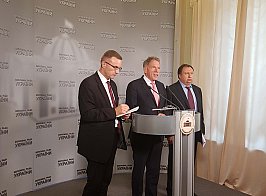International activity
‘It’s unacceptable that cars with the Z symbols drive freely on the streets of Germany’, Ivanna Klympush-Tsintsadze
The Chair of the Committee on Ukraine's integration into the EU took part
in the discussion ‘The war in Ukraine as a challenge for German-Ukrainian
relations’. The discussion was a part of the 17th annual conference of
Kyiv Dialogue.
Ivanna Klympush-Tsintsadze noted that, unfortunately, Germany recently has
not demonstrated the leadership everyone had used to. It did not become a
leader in the procedure of granting candidate status to Ukraine. ‘Now,
Germany can and should take a leading position regarding the EU
enlargement, supporting Ukraine on the path of its transformation, and
regarding opening of negotiations on Ukraine’s EU accession. This will
allow Germany to regain its leadership, and Europe — to return the real
Germany’, the Chair of the Committee said.
Of course, after obtaining the candidate status, many tasks must be
fulfilled by Ukraine: ‘It will depend on us, whether Ukraine wil
demonstrate the political will to change, to what extend it will be able
to build the capacity of its institutions even during the war, to that
extend it will be ready to involve different stakeholders within society
in order to reach consensus in solving difficult tasks on the way to the
opening of membership negotiations or subsequent obtaining membership in
the European Union’.
At the same time, Ivanna Klympush-Tsintsadze is sure that important roles
in this process are played by both the European Union and member states
like Germany: ‘It's a two-way street. And all of us, when we were working
on obtaining candidate status, hoped that this status would not only speed
up internal reforms, but also allow us to involve more intensively our
European partners in monitoring situation in Ukraine. To my mind, it is
essential. Your knowledge, experience, your investments, your resources
are crucial for the success of this path’.
The Chair of the Committee noted that it’s important for Ukraine to
receive feedback from the EU regarding the fulfilment of the seven
conditions that accompanied granting candidate status to Ukraine. ‘There
are certain adjustments inside the country that need to be done promptly.
We should, however, pay attention not only to the speed, but also to the
quality. In order to keep pace, we need feedback from the European Union’,
said Ivanna Klympush-Tsintsadze.
She is sure that without Ukraine the European project will not be
successful: ‘To become a serious geopolitical player, it should help
Ukraine to go through this path as quickly as possible and not pose
additional obstacles. I would like the EU to be both an economic giant, a
political giant, and a real military power so that the world could listen
to the position of the European Union, and this can be done with Ukraine.
Ukraine can provide innovative, human, creative potential, economic and
resource opportunities, but it is obvious that this path must be taken
together. Not everything is going as smoothly as we would like’.
The Chair of the Committee noted that in Ukraine, interaction between the
Parliament and the Government regarding the fulfilment of the seven
conditions which accompanied granting of candidate status is now loudly
declared. A fast-track mechanism for the implementation of these tasks has
been developed through the interaction of the Parliament with the
Government. ‘At the same time, I do not see enough capacity, experts who
would help us move quickly and efficiently on this path. And here, the
role of Germany and the EU could be powerful in facilitating public
administration development, which, regardless of who is in power,
regardless of political appetites, would further determine our ability to
move towards the goal’, she emphasized.
There is one more area that, according to Ivanna Klympush-Tsintsadze,
Germany should pay attention to. This is a question of leadership in
opposing the new fascism in Europe, which comes from the Russian
Federation. Not only weapons supply, financial support and help for
Ukrainian refugees are needed, but also internal work that Germany should
carry out. ‘It’s unacceptable that cars with the Z symbols drive freely on
the streets of Germany. That more than 100 FSB agents continue to work in
Germany under diplomatic cover. That Germany today cannot stop
letting in tourists from the Russian Federation who are fleeing
mobilization. Germany, unfortunately, continues to separate the power of
Russia from the citizens of Russia in this war. And this is an
unacceptable mistake, because the majority of the population of the
Russian Federation supports this war’, she said. The Chair of the
Committee reminded that it is not Putin who personally kills, rapes,
tortures Ukrainians and destroys Ukrainian cities, but citizens of the
Russian Federation: ‘None of them initiated rallies until the war started
affecting them personally.That's why the privilege of visiting Europe,
which people have by obtaining visas, would not be granted to everyone who
is just trying to save oneself. It is time for Germany to take a
responsible approach and to make it clear to the citizens of Russia that
they bear direct responsibility for their state’.
Ivanna Klympush-Tsintsadze emphasized that the European Union and its
member states must strongly defend the values they declare: ‘I hope that
the EU can find tools to prevent the erosion of those values that we stand
for today and that the free world helps us to protect’.

